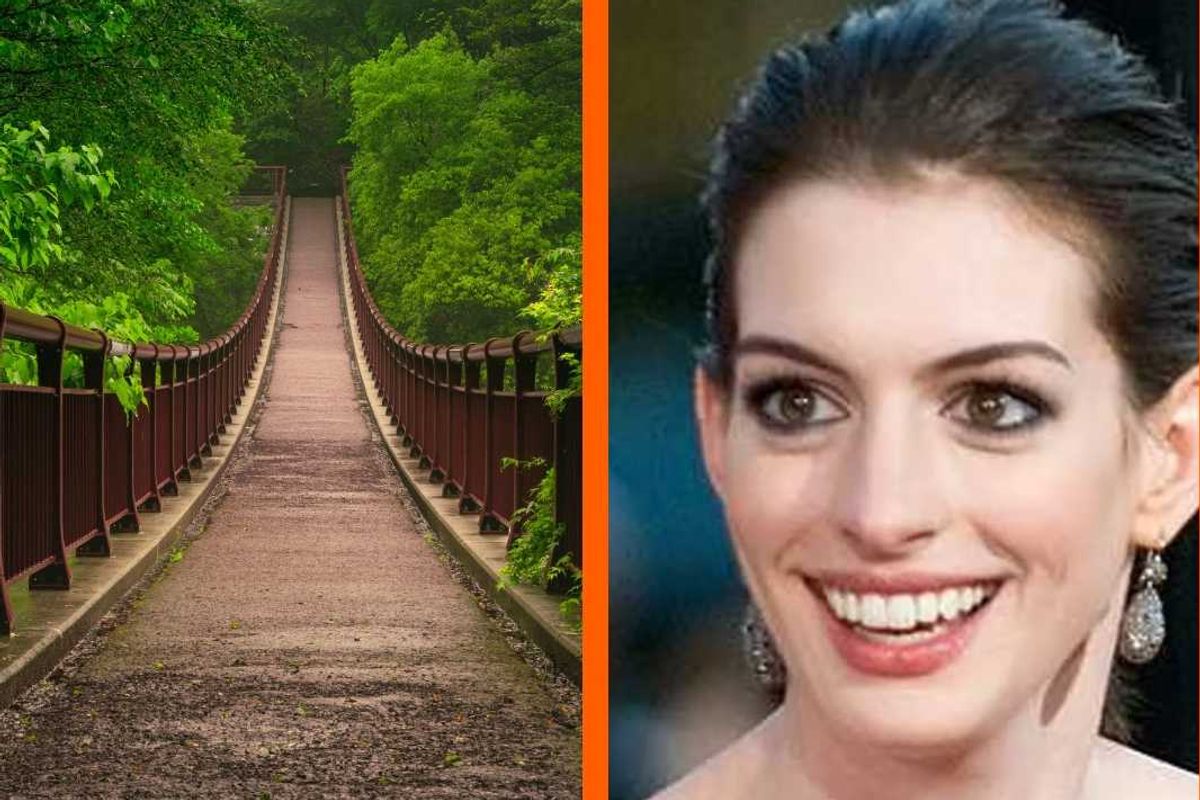Man uses Anne Hathaway clip to explain 'bridge back' method to regain control of a conversation
All it takes is 3 simple steps.
A beautiful bridge. Anne Hathaway.
Have you ever found that you've lost control of a conversation? Perhaps you're making a point about something when it's derailed by a topic you'd rather not discuss. Rather than get frustrated, there's a super simple technique one can use to get back on track. It's called the "bridge back" method, and once you understand how it's done, it can be an incredibly useful tool in conversation.
The "bridge back" method is often exemplified in interviews. Rob D. Willis, a strategic story producer, shared an interview on his Instagram that Matt Lauer conducted with Anne Hathaway during her Les Misérables press junket tour. In this re-surfaced clip making the rounds online, Lauer brings up a "wardrobe malfunction" and asks her what "lessons she learned."
First, Hathaway acknowledges that it happened. She then explains how it made her feel. "It kind of made me sad on two accounts. One, I was very sad that we live in an age when someone takes a picture of another person in a vulnerable moment rather than delete it. And I'm sorry that we live in a culture that commodifies sexuality of unwilling participants, which brings us back to Les Mis because that's what my character is." (Hathaway played Fantine, a sex worker in France in the 1800s.)
Willis pauses the clip here and points out that this is a classic "trap question" that a celebrity often gets. "The journalist wants an embarrassing story, but the actor wants to talk about what they're working on." He praises Hathaway's bridge back technique and says "it's perfect for difficult questions."
He breaks down how she does it:
Step 1: Briefly acknowledge
“It was obviously an unfortunate incident”
She owns it without dwelling on it or getting emotional.
Step 2: Connect to the bigger picture
“It kind of made me sad on two accounts. One was that I was very sad that we live in an age when someone takes a picture of another person in a vulnerable moment and rather than delete it... And I’m sorry that we live in a culture that commodifies sexuality of unwilling participants.”
She moves the frame from her personal mistake to a cultural critique.
Step 3: Return to your point
“Which brings us back to Les Mis — because that’s what my character is”
Anne Hathaway appears on TheToday Show to discuss Les Misérables www.youtube.com, Kingsherry, The Today show
On Vocate, a site dedicated to building communication and public speaking skills, they note, “Good bridging isn’t about avoidance. It’s about reframing. A skillful speaker acknowledges the legitimacy of the question but still takes the opportunity to express what truly matters to them and their audience.”
They add that the method is also often seen with skilled politicians, writing, “Used well, it creates space for clarity, narrative control, and audience connection.” For a slightly easier way to memorize the tip, they call it the "ABC method"—“Acknowledge, Bridge, Communicate.”
On the Cornerstone Coaching and Training site, human resources consultant Betty Lochner goes over similar ideas and stresses the importance of staying in control without getting aggressive or defensive. “Learning how to bridge conversations is learning how to move someone from where they want the conversation to be to where you want it to go.”
Nadhi Saini gives examples on how to use bridging in conversations. www.youtube.com, Nidhi Saini

